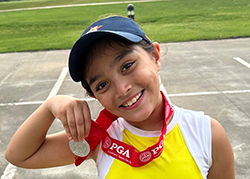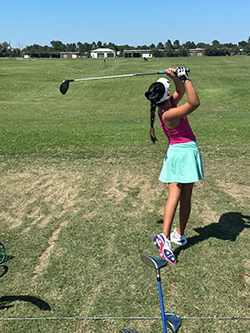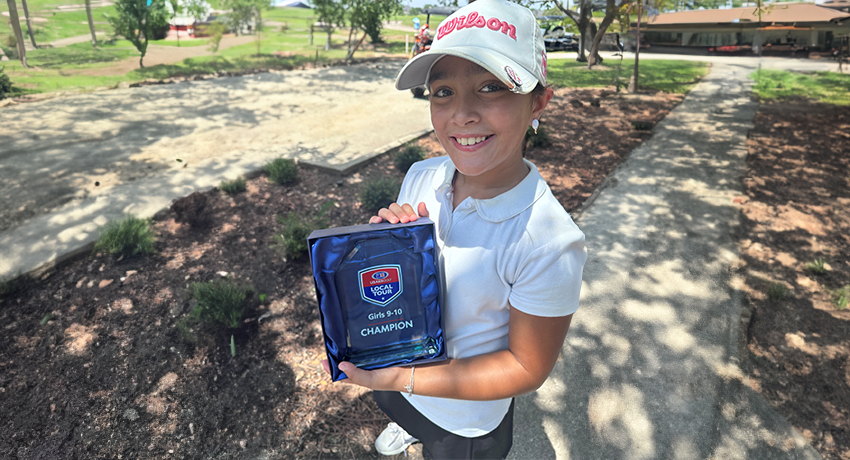Ariella Konwar is a bubbly 9-year-old with a passion for sports. This outgoing, young athlete is fresh off her first win at a U.S. Kids Golf tournament.
“I am so proud of her,” said her mother, Ronit Konwar.
The exciting moment was profound for Ariella after being diagnosed with juvenile idiopathic arthritis (JIA) at 6.
Arthritis diagnosis

Over several weeks in 2021, Ariella began experiencing progressive leg pain and woke up one morning unable to walk.
“She was screaming and crying,” recalled Ronit. “She said, ‘Mommy, my legs are hurting me. I can’t move my legs.’ They were swollen, and her knees were pointed inward.”
Ariella was diagnosed with JIA and referred to Monica A. Bray, MD, a pediatric rheumatologist with UT Physicians, for treatment.
Juvenile idiopathic arthritis
Arthritis is a general term for joint inflammation commonly associated with older adults.
JIA is a specific condition that impacts children and can be diagnosed in kids as young as 2. This form of arthritis occurs when the immune system chronically attacks the joint, causing inflammation that lasts until it is treated.
It is an autoimmune disease that can present anywhere there is a joint, such as the jaw, hands, ankles, wrists, and knees.
Symptoms include swelling, inability to straighten the joint, reduced range of motion, persistent limp after laying down for a long period, and sometimes mild pain.
“When Ariella came to me, she was dealing with bilateral knee effusions, meaning she had extra fluid in her knees, which were swollen,” said Bray.
Left untreated, the disease can change the way the bones develop. It can speed up bone growth, cause premature fusion of growth plates, and damage joints.
“We usually don’t see permanent damage if we can diagnose and treat it within the first six months of symptoms,” said Bray, an assistant professor with McGovern Medical School at UTHealth Houston.
Timely diagnosis
Ariella’s mother was also diagnosed with JIA as a child. Because of her own experience, Ronit recognized the symptoms and was able to help her daughter receive a timely diagnosis and treatment plan.
“There is a sweet spot when diagnosing JIA,” said Bray. “We want to see patients within the first one to two months of symptoms but not within the first few days because it could be swelling from something else, such as an injury.”
Risk factors
There is no known cause of JIA and no specific gene associated with it, but there could be a family link.
“We don’t think it’s directly inherited,” said Bray. “There is genetic susceptibility, and we believe something triggers it, like an infection.”
Treatment
Ariella first began seeing Bray every few weeks for routine bloodwork and to monitor signs of inflammation.
Her JIA treatment involved steroid injections in her knees, which reduced the initial swelling. Over the course of several months, she developed pain in her jaw and a complication with her right eye. She was placed on a biologic medication, given by injection in her leg every two weeks.
Eye complication
In addition to being watched for inflammation, pediatric patients are monitored by an ophthalmologist for a condition called uveitis, which is associated with JIA. Uveitis occurs when the immune system attacks the uvea, a layer in the eye wall. This causes inflammation in the eyeball, which can lead to blurred vision or vision loss if untreated.
“The condition is painless, and by the time it affects vision, the damage is already done,” said Bray. “The only way to detect it ahead of time is through screening by a trained ophthalmologist.”
Ariella was diagnosed with mild uveitis in her right eye and treated with eye drops for about six months.

Recovery
Treatment for JIA will often last through childhood as pediatric patients deal with flare-ups from infection.
The goal for all children with JIA is to go into long-term remission and continue their active life.
“JIA is a disease we can treat with minimal side effects,” said Bray.
Ariella took a short time off from sports as she adjusted to her medication but was back to her usual routine within several months of her diagnosis.
“With Dr. Bray’s approval, she resumed sports, playing with friends, and running around at school,” said Ronit. “As long as she wanted to do it and wasn’t in pain, she was allowed to do it.”

Back to the green
It was no surprise to her family when Ariella returned to the golf course ready to focus.
“From day 1, she followed instructions and knew exactly what she needed to do for her recovery, what medicine to take, how often, and when,” said Ronit. “Her passion is what got her through all this.”
The young athlete was just 4 when her father introduced her to golf. Now 9, she is looking ahead to her future.
Her dedication to the sport means practicing nearly every day and participating in six to eight tournaments a month.
“Her prognosis is excellent,” said Bray.
Medical care
Thanks to the advanced and compassionate care she received from her team at UT Physicians, this young girl isn’t letting a JIA diagnosis define her childhood.
“Dr. Bray is a gem,” said Ronit. “I was really worried about how serious this would be, but Dr. Bray and her staff were amazing. They were professional, calming, and attentive from day 1.”
Ronit says sharing her daughter’s story of perseverance is important to comfort other families.
“Stay focused on staying calm and do your research. Every question is a good one because this is your child’s health,” said Ronit. “Be an advocate for your child.”


